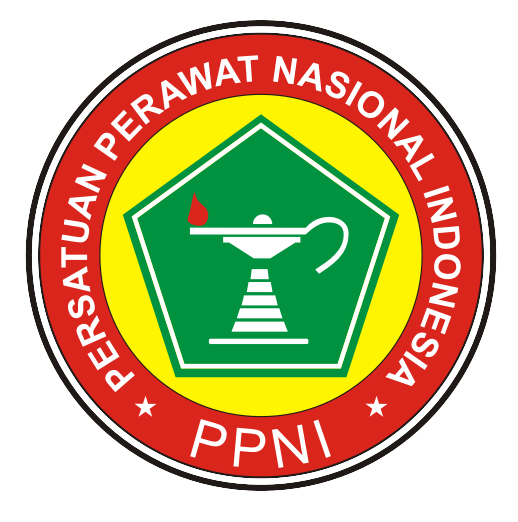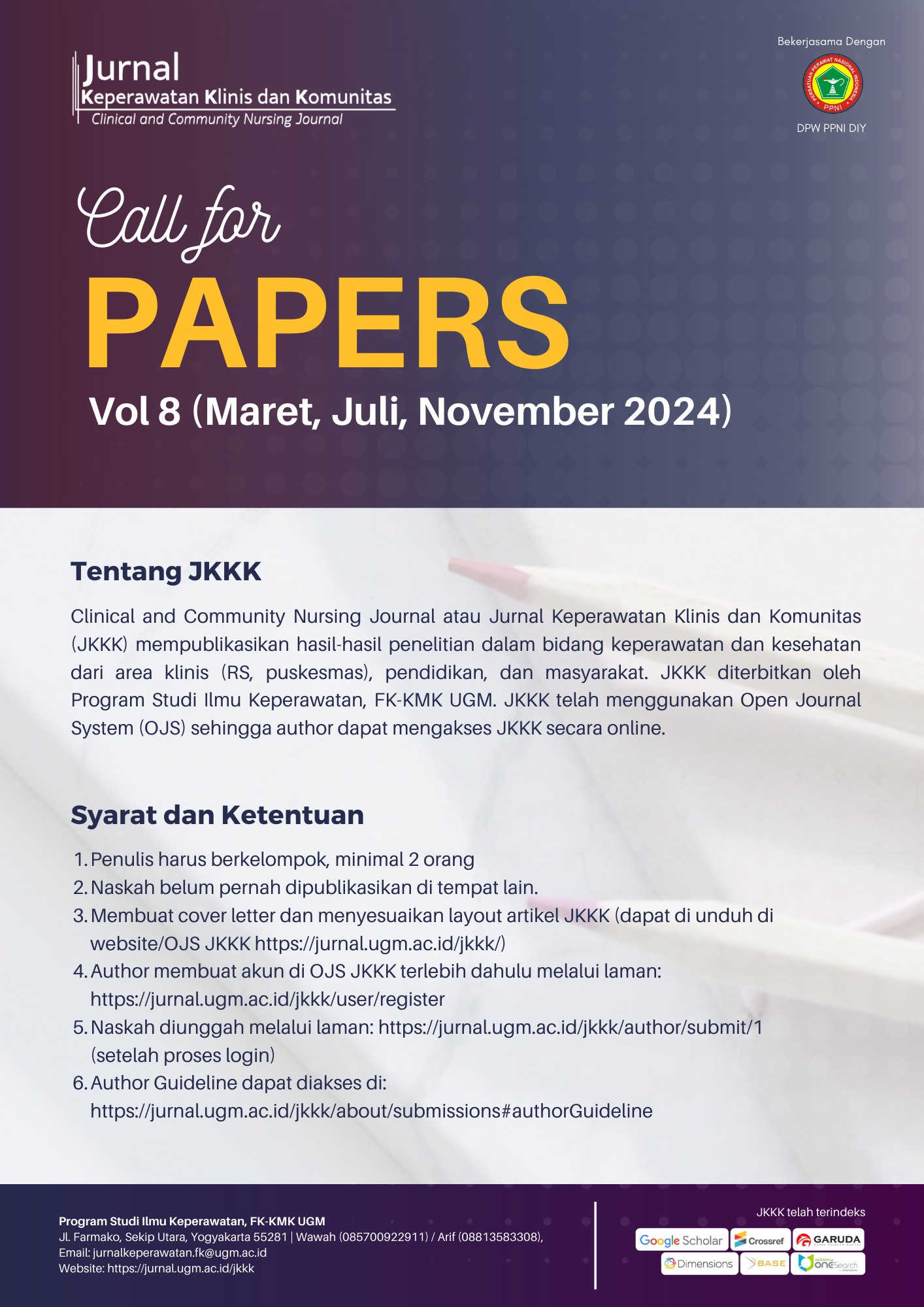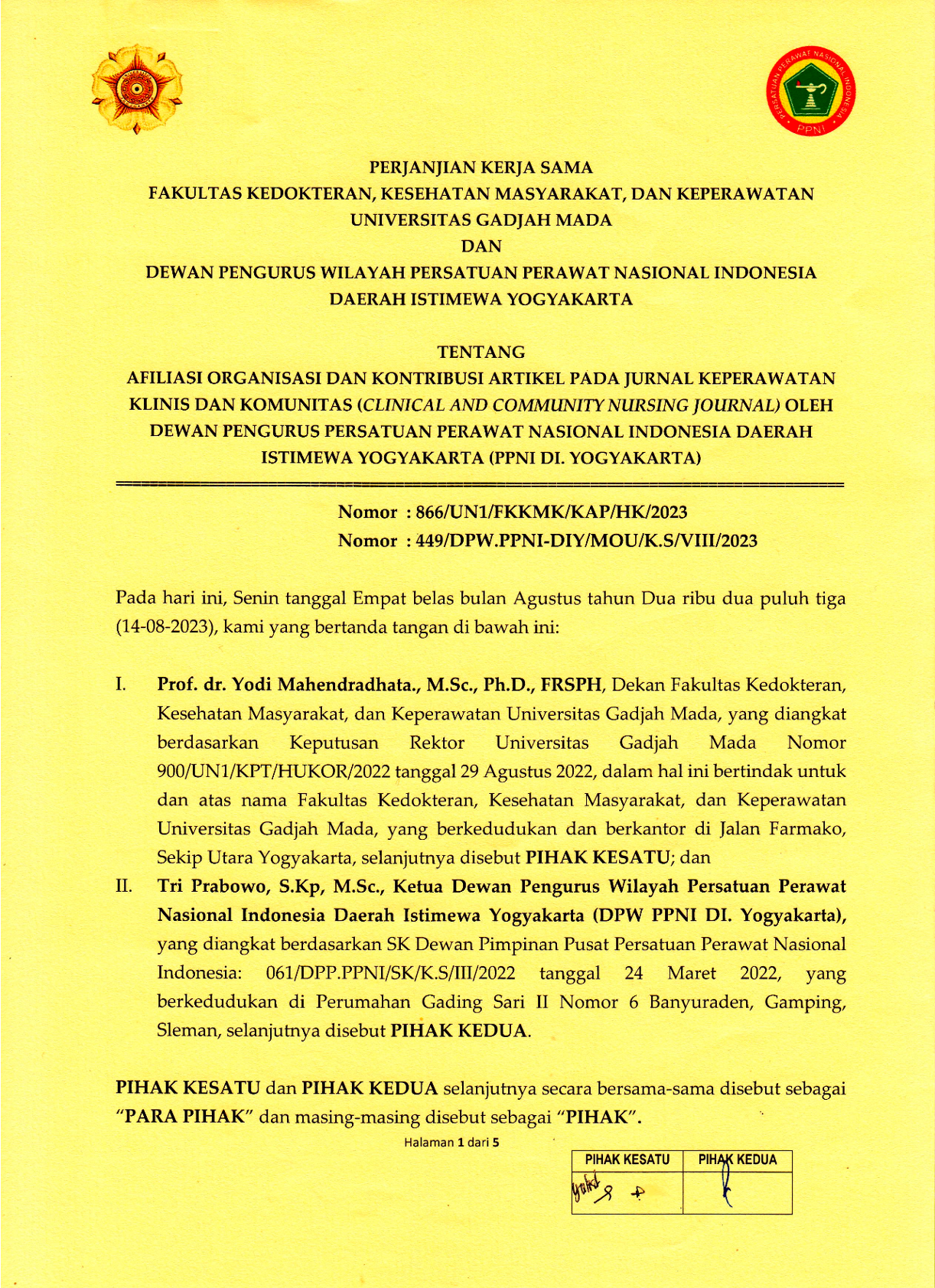Pengaruh Pendidikan Kesehatan Reproduksi Berbasis Kesetaraan Gender Terhadap Efikasi Diri Seksual Remaja Putra Siswa SMP di Kota Yogyakarta
Annisa Rachmawati(1*), Wenny Artanty Nisman(2), Ika Parmawati(3)
(1) Program Studi Ilmu Keperawatan, Fakultas Kedokteran, Kesehatan Masyarakat, dan Keperawatan, Universitas Gadjah Mada
(2) Departemen Keperawatan Anak dan Maternitas, Fakultas Kedokteran, Kesehatan Masyarakat, dan Keperawatan, Universitas Gadjah Mada
(3) Departemen Keperawatan Anak dan Maternitas, Fakultas Kedokteran, Kesehatan Masyarakat, dan Keperawatan, Universitas Gadjah Mada
(*) Corresponding Author
Abstract
Background: Teenagers experience various changes, both physically and physiologically. Prominent changes result in the attraction of the opposite sex thus begin to feel sexual desire. Society that favored one gender increases the possibility of adolescents to develop risky sexual behavior. Reproductive health education is an intervention that can be done to reduce the sexual risk behavior in adolescents.
Objectives: This study aims to determine the effect of gender equality-based reproductive health education on sexual self-efficacy of male students.
Method: This study was a quasi-experimental study with pretest-posttest with a control group. Samples were taken by consecutive sampling technique. Respondents were 33 male adolescents who were given gender equality-based reproductive health education and 34 male adolescents with usual reproductive health education only that were conducted by the Puskesmas as a control group. Sexual self-efficacy was measured by the adolescent sexual self-efficacy questionnaire developed by researchers (r >0,1754; p= 0,745).
Results: Differences in the self-efficacy score on pretest-posttest treatment group were -3,54 ± 12,88 and the control group was 3,09 ± 13,25. The treatment group has a value of p = 0,124 and the control group p = 0,183 so that the two did not experience a significant increase. There was a significant difference between the treatment group and the control group with a value of p= 0,034 but there was a decline in self-efficacy in the treatment group. The relationship test results show that the idol correlates with the increase in the male sexual self-efficacy score.
Conclusion: Gender-based reproductive health education has no effect on increasing the male sexual self-efficacy score.
Latar belakang: Remaja mengalami berbagai perubahan, baik perubahan secara fisik maupun psikologis. Perubahan yang menonjol mengakibatkan munculnya ketertarikan terhadap lawan jenis yang memicu munculnya hasrat seksual. Budaya masyarakat yang mengunggulkan salah satu gender meningkatkan kerentanan remaja untuk melakukan perilaku seksual berisiko. Pendidikan kesehatan reproduksi merupakan salah satu upaya yang dapat dilakukan untuk mengurangi perilaku berisiko seksual pada remaja.
Tujuan: Penelitian ini bertujuan untuk mengetahui pengaruh pendidikan kesehatan reproduksi berbasis kesetaraan gender terhadap efikasi diri seksual remaja putra.
Metode: Penelitian ini merupakan penelitian quasi experimental with pretest-posttest dengan kelompok kontrol. Sampel diambil dengan teknik consecutive sampling. Responden adalah 33 remaja putra yang diberikan pendidikan kesehatan reproduksi berbasis kesetaraan gender dan 34 remaja putra dengan pendidikan kesehatan reproduksi yang biasa dilakukan Puskesmas sebagai kelompok kontrol. Efikasi diri seksual diukur dengan kuesioner efikasi diri seksual remaja yang dikembangkan oleh peneliti.
Hasil: Beda peningkatan skor efikasi diri pada pretest-posttest kelompok perlakuan sebesar -3,54±12,88 (p = 0,124) dan kelompok kontrol sebesar 3,09±13,25 (p = 0,183) sehingga keduanya tidak mengalami peningkatan signifikan. Terdapat perbedaan yang bermakna antara kelompok perlakuan dan kelompok kontrol dengan nilai p = 0,042 namun terjadi penurunan rerata pada kelompok perlakuan. Hasil uji hubungan menunjukkan idola berkorelasi dengan peningkatan skor efikasi diri seksual remaja putra.
Kesimpulan: Pendidikan kesehatan reproduksi berbasis kesetaraan gender tidak berpengaruh terhadap peningkatan skor efikasi diri seksual remaja putra.
Keywords
Full Text:
PDFReferences
- World Health Organization. Adolescence: a period needing special attention - recognizing-adolescence [Internet]. World Health Organization. 2004 [cited 2018 Feb 14]. Available from: https://apps.who.int/adolescent/second-decade/section2/page1/recognizing-adolescence.html
- World Health Organization. Health for the world’s adolescents: a second chance in the second decade: summary [Internet]. World Health Organization. 2004 [cited 2018 Feb 14]. Available from: https://apps.who.int/iris/handle/10665/112750
- Hidayangsih PS. Perilaku Berisiko dan Permasalahan Kesehatan Reproduksi pada Remaja. J Kesehat Reproduksi [Internet]. 2014 [cited 2018 Feb 15];5(2):89–101. Available from: http://ejournal.litbang.kemkes.go.id/index.php/kespro/article/view/3886
- Institute of Medicine (IOM) and National Research Council (NRC) Committee onthe Science of Adolescence. The Science of Adolescent Risk-Taking: Workshop Report. Sci Adolesc Risk-Taking [Internet]. 2011 Jan 25; Available from: https://www.ncbi.nlm.nih.gov/books/NBK53418/
- Kusumawardani N, Rachmalina DS, dr Yuana Wiryawan Ms, Dra Athena Anwar Mk, Kartika Handayani Ms, Rofingatul Mubasyiroh Ms, et al. Perilaku Berisiko Kesehatan Pada Pelajar SMP Dan SMA Di Indonesia Disusun oleh [Internet]. Jakarta; 2015 [cited 2018 Feb 18]. Available from: http://www.who.int/ncds/surveillance/gshs/GSHS_2015_Indonesia_Report_Bahasa.pdf
- Badan Kependudukan Keluarga Berencana Nasional, Badan Pusat Statistik, Kementerian Kesehatan, ICF International. Survei Demografi dan Kesehatan Indonesia 2012 [Internet]. 2013 [cited 2018 Mar 24]. Available from: www.measuredhs.com.
- Morris JL, Rushwan H. Adolescent sexual and reproductive health: The global challenges. Int J Gynaecol Obstet [Internet]. 2015 Oct 1 [cited 2018 Feb 20];131 Suppl 1:S40–2. Available from: https://pubmed.ncbi.nlm.nih.gov/26433504/
- Lestary H, Sugiharti. Perilaku Berisiko Remaja di Indonesia Menurut Survey Kesehatan Reproduksi Remaja Indonesia (SKRRI) Tahun 2007. J Kesehat Reproduksi [Internet]. 2011 [cited 2018 Feb 15];1(3):136–44. Available from: http://ejournal.litbang.depkes.go.id/index.php/kespro/article/download/1389/696
- Mahmudah M, Yaunin Y, Lestari Y. Faktor-Faktor yang Berhubungan dengan Perilaku Seksual Remaja di Kota Padang. J Kesehat Andalas [Internet]. 2016 Aug 11 [cited 2018 Feb 27];5(2). Available from: http://jurnal.fk.unand.ac.id/index.php/jka/article/view/538
- Lefkowitz ES, Shearer CL, Gillen MM, Espinosa-Hernandez G. How Gendered Attitudes Relate to Women’s and Men’s Sexual Behaviors and Beliefs. Sex Cult [Internet]. 2014 Dec 1 [cited 2018 Feb 18];18(4):833. Available from: https://www.ncbi.nlm.nih.gov/pmc/articles/PMC4244004/
- Puente D, Zabaleta E, Rodríguez-Blanco T, Cabanas M, Monteagudo M, Pueyo MJ, et al. Gender differences in sexual risk behaviour among adolescents in Catalonia, Spain. Gac Sanit [Internet]. 2011 Jan [cited 2018 Feb 27];25(1):13–9. Available from: https://pubmed.ncbi.nlm.nih.gov/21315492/
- Jewkes R, Morrell R. Gender and sexuality: emerging perspectives from the heterosexual epidemic in South Africa and implications for HIV risk and prevention. J Int AIDS Soc [Internet]. 2010 [cited 2018 May 23];13(1). Available from: https://pubmed.ncbi.nlm.nih.gov/20181124/
- Seftyandani N. Hubungan Efikasi Diri, Pengetahuan Kesehatan Reproduksi dan SIkap Perilaku Seksual Remaja Putri di Wilayah Kerja Puskesmas Dawan II Kabupaten Klungkung [Skripsi] [Internet]. Badung: Program Studi Ilmu Kesehatan Mayarakat, Fakultas Kedokteran, Universitas Udayana; 2015 [cited 2018 Aug 14]. Available from: https://sinta.unud.ac.id/uploads/wisuda/1320015033-1-AWAL.pdf
- Bandura A. Guide for Construction Self-Eficacy Scale. In: Pajares F, Urdan T, editors. Self-Efficacy Beliefs of Adolescents. Greenwich: Information Age Publishing; 2005. p. 307–37.
- Redmond M, Lewis R. Are there gender differences in perceived sexual self-efficacy among African-American adolescents? J Health Dispar Res Pract [Internet]. 2015 Jan 23 [cited 2018 Sep 24];7(5). Available from: https://digitalscholarship.unlv.edu/jhdrp/vol7/iss5/1
- Syamsulhuda B. Musthofa, Puji Winarti. Faktor yang Mempengaruhi Perilaku Seks Pranikah Mahasiswa di Pekalongan Tahun 2009-2010. J Kesehat Reproduksi [Internet]. 2010 [cited 2022 Mar 11];1(1). Available from: http://ejournal.litbang.kemkes.go.id/index.php/kespro/article/view/1321
- Kirby D, Coyle K, Alton F, Rolleri L, Robin L. Reducing Adolescent Sexual Risk: A Theoretical Guide for Developing and Adapting Curriculum-Based Programs. CA: ETR Associates; 2011. 160 p.
- Unesco., UN Women., UNICEF., UNFPA., Joint United Nations Programme on HIV/AIDS., WHO. International technical guidance on sexuality education : an evidence-informed approach. UNESCO; 2018.
- Parmawati I. Pengaruh Pendidikan Kesehatan Reproduksi Berbasis Kesetaraan Gender dalam Meningkatkan Pengetahuan, Sikap dan Efikasi Diri Remaja Putri di Wilayah Kerja Puskesmas Temon 1 Kulon Progo Yogyakarta [Tesis]. Yogyakarta: Fakultas Kedokteran, Universitas Gadjah Mada; 2015.
- Alavi-Arjas F, Farnam F, Granmayeh M, Haghani H. The Effect of Sexual and Reproductive Health Education on Knowledge and Self-Efficacy of School Counselors. J Adolesc Health. 2018 Nov 1;63(5):615–20.
- Budiman, Riyanto. Kuesioner Pengetahuan dan Sikap Dalam Penelitian Kesehatan. jakarta: salemba medika; 2013.
- World Health Organization. Participant manual : IMAI one-day orientation on adolescents living with HIV [Internet]. World Health Organization. 2010 [cited 2018 Mar 19]. Available from: https://apps.who.int/iris/handle/10665/44258
- Hall C, Burstein G. Adolescent Development. In: Kliegman R, Stanton B, Geme J, Schor N, editors. Nelson Textbook of Pediatrics , 8th ed. Philadelphia: Elsevier; 2016.
- Rashid AA, Mamat A. Barriers to Moral Development of Adolescents and Parental Responsibility: The Case of Malay Working Parents [Internet]. Vol. 1, International Journal of Humanities Social Sciences and Education (IJHSSE). 2014 [cited 2018 May 16]. Available from: www.arcjournals.org
- Rohrbach LA, Berglas NF, Jerman P, Angulo-Olaiz F, Chou CP, Constantine NA. A Rights-Based Sexuality Education Curriculum for Adolescents: 1-Year Outcomes From a Cluster-Randomized Trial. J Adolesc Health [Internet]. 2015 Oct 1 [cited 2018 May 17];57(4):399–406. Available from: https://pubmed.ncbi.nlm.nih.gov/26403840/
- Kinsler J, Sneed CD, Morisky DE, Ang A. Evaluation of a school-based intervention for HIV/AIDS prevention among Belizean adolescents. Health Educ Res. 2004 Dec;19(6):730–8.
- Kogan SM, Yu T, Brody GH, Chen YF, Diclemente RJ, Wingood GM, et al. Integrating condom skills into family-centered prevention: efficacy of the Strong African American Families-Teen program. J Adolesc Health. 2012 Aug;51(2):164–70.
- Prahara SA, Budiyani K. Pelatihan Efikasi Diri untuk Meningkatkan Efikasi Diri Terhadap Kemampuan Berwirausaha Anak Down Syindorme pada Orangtua. Insight J Ilm Psikol [Internet]. 2018 Feb 26 [cited 2018 May 16];20(1):1–14. Available from: http://ejurnal.mercubuana-yogya.ac.id/index.php/psikologi/article/view/629
- Witami NM, Rustika IM. Perbedaan Taraf Efikasi Diri Ditinjau dari Keikutsertaan dalam Latihan Yoga pada Remaja Akhir Mahasiswa Institut Hindhu Dharma Negeri Denpasar. J Psikol Udayana [Internet]. 2018 [cited 2018 May 16];Edisi Khusus. Available from: https://ojs.unud.ac.id/index.php/psikologi/article/view/40397
- Wilandika A. Kajian Intervensi Pencegahan Perilaku Seksual Berisiko HIV dalam Peningkatan Self- Efficacy Pada Remaja. J Sk Keperawatan [Internet]. 2017 Jun 13 [cited 2018 May 23];3(1):1. Available from: https://jurnal.unai.edu/index.php/jsk/article/view/574
- Sutrisno VLP, Siswanto BT. Faktor-faktor yang mempengaruhi hasil belajar siswa pada pembelajaran praktik kelistrikan otomotif SMK di Kota Yogyakarta. J Pendidik Vokasi. 2016 Mar 16;6(1):111–20.
- Citrawati NK, Widyandana, D.Hapsari E. Pengaruh pendidikan kesehatan dengan media audiovisual manajemen laktasi terhadap tingkat pengetahuan dan self efficacy ibu menyusui. 2015;
- Sella YP. Analisa Perilaku Imitasi Dikalangan Remaja Setelah Menonton Tayangan Drama Seri Korea di Indosiar ( Studi Kasus P erumahan Pondok Karya Lestari Sei Kapih Samarinda ). eJournal Ilmu Komun [Internet]. 2013 [cited 2018 May 22];1(3):66–80. Available from: https://www.dropbox.com/s/46qo590la7zv4ls/jpkomunikasidd130205.pdf?dl=0
- Alfaiz A, Zulfikar Z, Yulia D. Efikasi Diri sebagai Faktor Prediksi Kesiapan Mahasiswa dalam Mengerjakan Tugas Kuliah. Ilmu Pendidik J Kaji Teor dan Prakt Kependidikan [Internet]. 2017 Dec 29 [cited 2018 May 19];2(2):119–24. Available from: http://journal2.um.ac.id/index.php/jktpk/article/view/2546
- Bandura A. Self-efficacy: Toward a unifying theory of behavioral change. Psychol Rev. 1977 Mar;84(2):191–215.
- Rustika IM. Efikasi Diri: Tinjauan Teori Albert Bandura. Bul Psikol. 2012;20(1–2):18–25.
Article Metrics
Refbacks
- There are currently no refbacks.
Copyright (c) 2019 Annisa Rachmawati, Wenny Artanty Nisman, Ika Parmawati

Jurnal Keperawatan Klinis dan Komunitas (Clinical and Community Nursing Journal)
collaborates with DPW PPNI DIY
![]()
Jurnal Keperawatan Klinis dan Komunitas (Clinical and Community Nursing Journal) is licensed under a Creative Commons Attribution-ShareAlike 4.0 International License.




